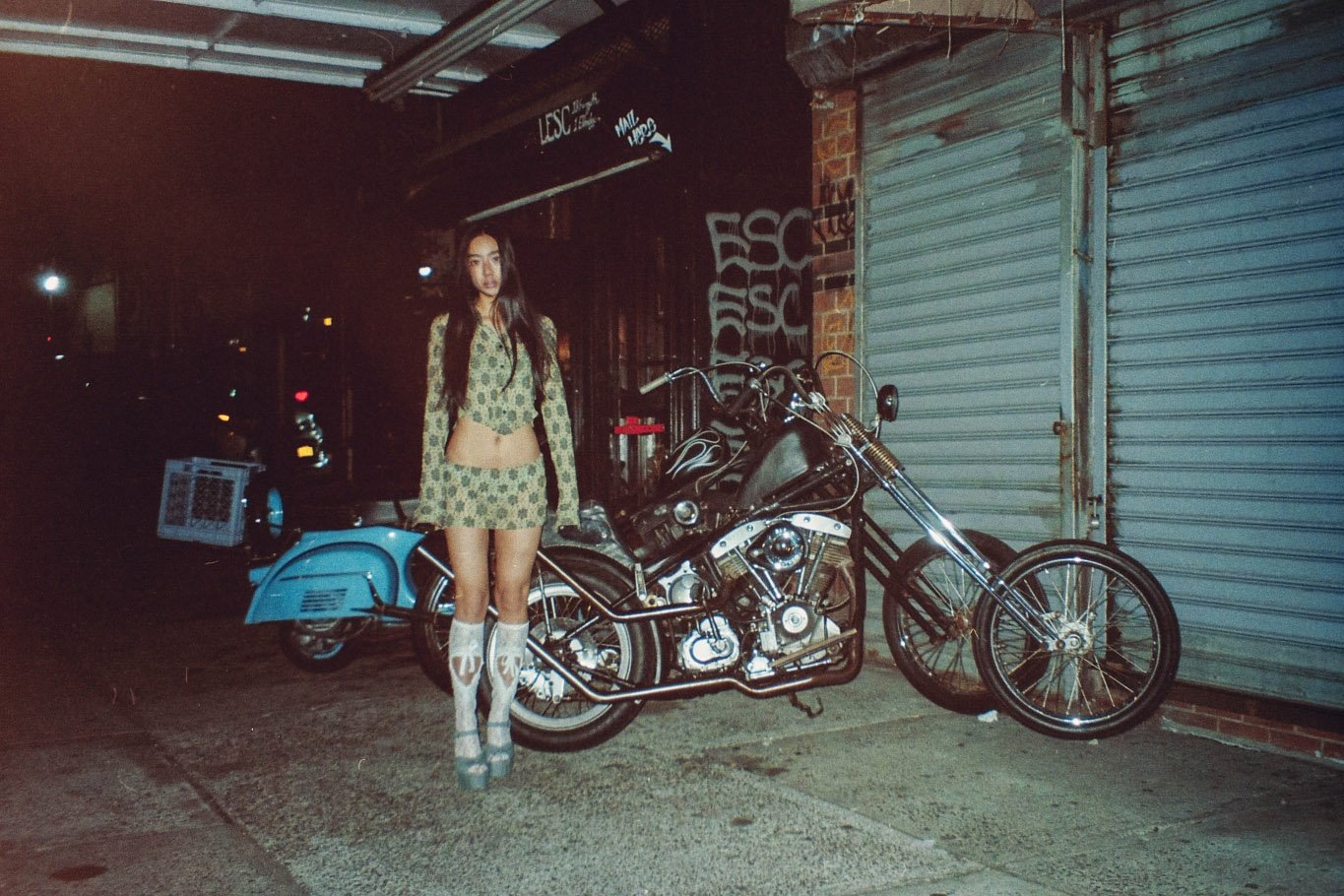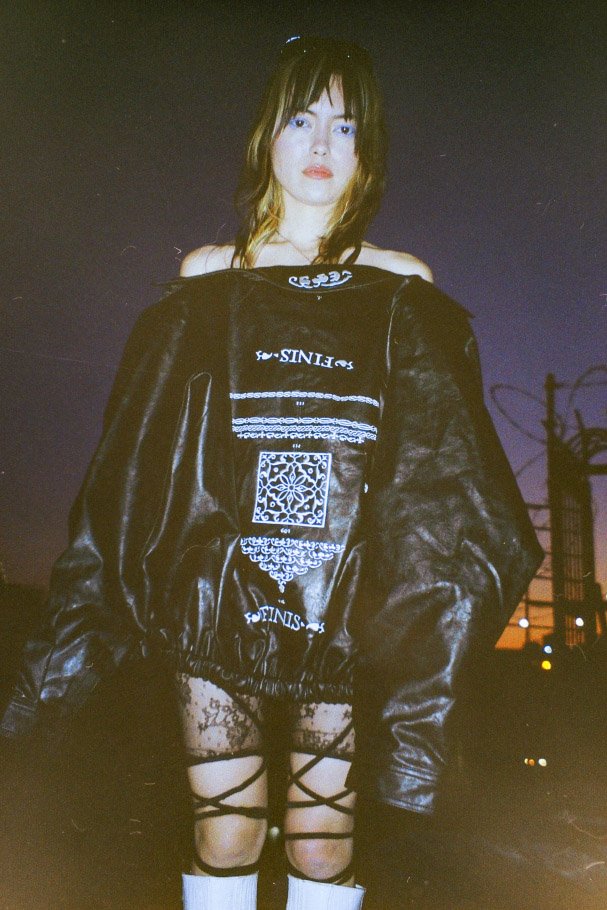604service
The wind carries the dove but the dove doesn’t know it. Its wings beat as if upon nothingness, up and down against an ambient current the same way water flows over the stones in the riverbed, rushing.
They become submissive, made in the image of the inevitable, smooth like the passing of time. Airborn, the dove leaves vulnerability behind, this act of defiance cloaks itself in habit as gravity is severed by reaction and desire. Yet, the wind still blows. The dove’s flight is insignificant to it, it is but a winged prayer fluttering against a cerulean abyss asking to be received, not held. The wind and the dove coexist, providing nothing for each other but proof of existence.
Stopping to personify these entities, we make mirrors out of parallels with shards of projections past. In its reflection: versions of ourselves distant enough to be seen clearly.
South-Korean brand, 604service is the dove.
Wayfaring against the cultural current of traditional Korean values and societal hallmarks, the brand is subversive but only against certain skies. Founded by Yu kyeong and Young seo in 2020, 604service’s collections underscore both a certain yearning for freedom and a sense of wish fulfillment, an intentional duality that strives for the maintenance of imbalance, teetering without falling. Ultimately presenting their garments as items of “service” to those who don their graphic-heavy cuts and dystopic silhouettes, the 604service client aspires to ascend - not entirely free from harmony’s chains but wearing them.
Images best tell this story and the brand has crafted an aesthetic for itself that feels intangible only because it is steps ahead, not only by South-Korean terms, but by Western standards as well. Ironically, it is Western standards that have been the brand’s gravity, a magnetic pull towards ideals of flippancy and wanton abandon. As 604service seeks to build bridges between itself and the larger creative community, we come to understand resonance in its pursuit.
Coeval’s Lindsey Okubo engages 604service via an email interview (facilitated by the help of a translator) in array of questions pointed and vague to paint a picture of the atmosphere in which the brand exists.
Hi Yu (*Yu kyeong) and Young Sea! (*Young seo)! Can you both tell me about your childhoods and your gradual and respective loss of innocence per se?
We have always had a passion for fashion since we were kids. Because we wanted to stand out, we tried a lot of unique and different styles than the ones our classmates were wearing. It seems that our fashion sense now stemmed from our childhood and trying styles to see what we liked and didn’t like.
Why is it important to describe yourselves as offering a service and not simply being a means of expression or a fashion choice? What service are you offering and who needs it?
When people say that "the service was good” in Korea, it means that they got a satisfactory impression about an experience. Buying our clothes doesn't just mean adding a piece of clothing to your closet, we hope that wearing it will make people feel more confident, express themselves the way they want to, and leave a memorable impression by wearing our clothes.
I know you had mentioned that 604service’s aesthetic derives from a rejection of mainstream pop-culture present in South Korea, what parts of this mainstream culture are you rejecting?
In Korea, humility is a virtue, so even in mainstream culture, being humble and harmonious with one’s surroundings is the most important thing. Those are very beautiful values, but sometimes we feel that they suppress individual freedom. By ‘rejecting mainstream culture’ we reject that suppression.
To what extent are your collections stories you’re telling the world through your brand? What is the role of storytelling in the world of 604service?
Boldness, freedom, and rebellion.
I feel like in the West and having worked in a background of branding and communications, most brands right now are collectively concerned with the same things: community, representation, visibility, diversity, inclusivity etc. to the point where individual meanings of these words have become homogenous and diluted. To what extent are you concerned with these ideas? What are you most concerned with?
There is a desire to grow not only in Korea, but also as a global brand. When trying to grow globally, we try to make clothes for all races, genders, etc.
Korea does not have much racial diversity compared to other societies, so we try to be as culturally aware as possible and study more to not create something that offends people from different backgrounds.
In the West we’ve also seen a new light being cast upon Asian visibility and a desire to be seen outside of stereotypical tropes. For many Asians in the West, we didn’t grow up with people who looked like us in the media, on magazine covers, doing cool things, being sexy etc. and now people are seeing how important that is. Obviously, growing up in Korea where this isn't the case, what’s your own take on the Western gaze and visibility itself? Does it then become more of an internal struggle to be seen by your own community in a way that expunges expectation?
We are very much inspired by western culture and how people pursue their own styles without a sense of fear of how they are seen in other people’s eyes. When we first made our clothes, we didn’t really care about how our style would be accepted in Korean culture. For a long time, we thought that having a strong and bold style in Korea wouldn't be accepted very easily. But now, we see a lot of Korean brands around us becoming more and more bold. We’re so proud that we are all growing together.
You guys use a lot of graphics, can you walk us through the process of designing them and what they are communicating with this new collection?
Usually, we pick a concept that challenges us for the next collection. We tend to refer to how each concept was defined in the past (2-3 hundred years ago). We prepare each concept to not look cliché and have them be uniquely our style.
The casting you do for all your shoots is always so interesting, can you talk about this process? Are they friends or part of the larger community of the brand? What defines a “good look” or a “right fit” for your models?
Models are usually found through Instagram. We don't look for people based on specific criteria (height or body shape) or their own personal styles, but imagine how they will fit when wearing our clothes.
On a similar note, what is the brand’s definition of beauty and how has that definition changed and how does it differ from mainstream standards in the Korean market?
Unbalance. As we said when looking for a model, how our clothes would look on the model is important. It is important to create a new image by adding unbalanced elements. (like a cute fluffy teddy bear in an old, rusty gym.) Calm and simple things are still more popular in Korea, so our tendency to make an unbalanced style differs from the mainstream.
What is your relationship to change?
Change is inevitable. Every day we learn new things and that influences how we make clothes and how we want to be seen as a brand.
What does heartbreak mean to you?
It feels like a part of me is disappearing forever.
If you could live forever would you want to? Why or why not?
60: I think we will value it more if we only live once.
04: No. It's hard to see people close to you leaving one by one.
What’s your opinion on artificial intelligence? Are you excited by the direction in which humanity seems to be moving? To what extent do you feel in control?
We honestly think AI can make everyday life more convenient. But in the art industry, we feel like it can discourage creators. Art is often valued for the process itself rather than just the result. However, AI just collects the data and makes results which can’t have the same value as real human creators. We are concerned that Ai will take the creator's job in the future.
With whom do you have the most impactful conversations with and what do you talk about?
60: I have the most impactful conversations with my close friend which brought me to the realization that I shouldn't judge people easily.
04: With my dad, he said life is one cycle and there is no going back. It made me focus more on making choices without regrets.
What does your utopia look like? To what extent is fantasy a part of your brand?
A world where everyone is equal and no one is excluded.
Have you had any supernatural encounters? What do you believe in?
It may be slightly different from supernatural encounters, but there are many superstitions about dream interpretation in Korea. (A dream of a pig is a dream in which wealth is coming, a dream in which teeth are falling out is a dream in which someone close to you becomes sick, etc.)
Do you believe that people should define themselves by what they do for a living? If not, how are you compartmentalizing certain aspects of your identity and is compartmentalization healthy?
We think what people do for a living and what you achieve are somewhat important because everyone puts their passion, time and effort into achieving something. However, doing the right thing, doing what we love, and whether it is an effort to make me happy is also important. Identity is, after all, not who we are today. It’s more “To what direction do we want to go in?
What are your personal definitions of fulfillment and success?
60: My personal definition of fulfillment and success is if I’m proud of myself and make a lot of money doing what I love.
04: A life with no worries before going to bed.
To what extent do you think one’s creative work can exist outside of his/her own personal narrative? I know there is some desired separation between your personal lives and the brand and how and why is that important?
We believe that the clothes we make do not necessarily represent who we are. Making bold clothes doesn’t necessarily lead to a bold life, as we can still pursue a quiet life. An individual and his/her work are continuously influenced by each other, but it seems that there is a need for some degree of separation to give and receive a more progressive influence.
Where are you stocked at and how important is it to have a physical place for customers to experience your product?
Our brand is stocked at several shops in the New York, Los Angeles, Sydney, Melbourne and Seoul.
We used to think that selling our clothes strictly online was the best route for us. As time went on, we noticed that some people would only look at our clothes online and think that our clothes were “too bold” and not for them. We believe that having our items in a physical place, can challenge people to see how our clothes can blend in with their own personal styles.
What has been lost in the digitization of fashion? What has been gained?
Through technology, it is as easy as ever to gain inspiration from different styles and backgrounds. But with that said, it is just as easy as ever to steal and copy designs. For smaller and independent brands like us, being unique is one of the most important values.
interview LINDSEY OKUBO
What to read next






















